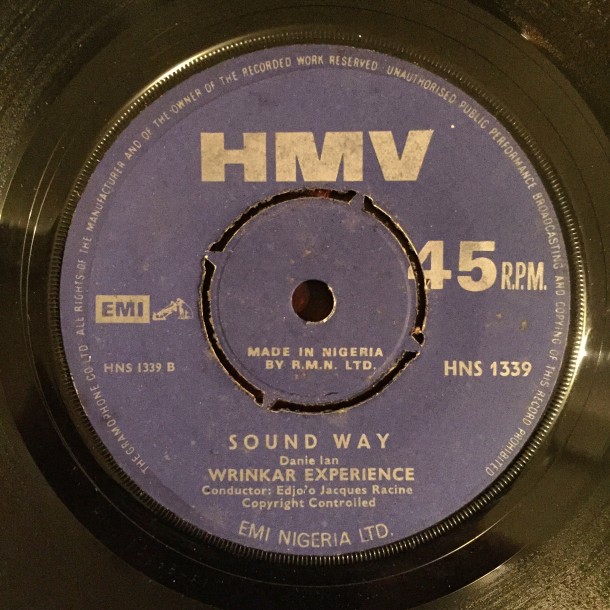


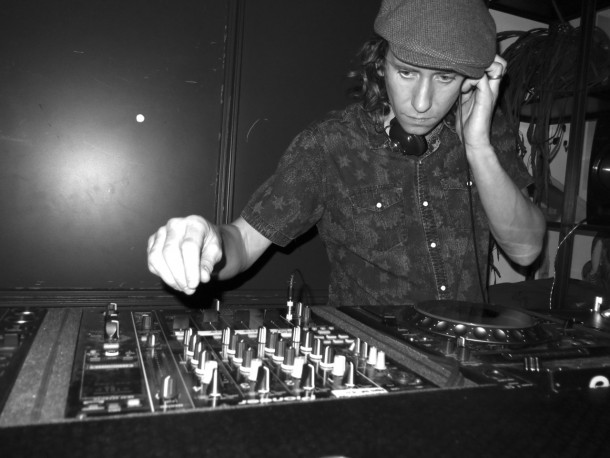
Each month, we are focusing on a record label founded by an active digger. This month, Miles Cleret from Soundway Records, one of our favorite labels around! From their amazing compilation series to beautiful reissues and great new tropical acts (think the mighty Meridian Brothers!), Miles Cleret’s choices and opinions are clearly worth checking!
When did you start digging records?
Properly when I was a teenager I guess – my dad was a digger (Jazz & Soul and 50s RnB and Rock & Roll mostly) so there were plenty in his house when I was growing up. It was hard though as money wasn’t an easy thing to get at the age of 14 but back then (the 80s) you could get good stuff in little record fairs and market stalls and there were just tons of record shops everywhere – even outside of London. The age of expensive rare records hadn’t really begun apart from the mega-fans who collected the big names in Rock and Pop (of which the UK had a lot). I wasn’t looking for rare stuff then though – just music that seemed exciting and new.
What Lps did you buy at first? Do you still listen to them?
Well not the very first records I bought – they were mostly really terrible pop records from when I was about 10. There was a store in the UK called Woolworths and you could buy discounted ex-chart 45s for about 20 pence so I’d spend all my pocket money on them for a few years until I was about 13. I remember buying most of the Beatles albums really cheaply on Spanish editions on a holiday in Barcelona when I was about 13 at a record store that was closing down. That changed my musical life a lot (my dad hated the Beatles so never had those records in the house) and then David Bowie, The Clash, the Cure and and then when I was about 14 or 15 I got into bands like Pink Floyd, Led Zeppelin, Hawkwind, Gong, The Grateful Dead, Caravan, Traffic etc – and yes I still listen to those LPs but I didn’t for a long time until recently – they have a way of transporting me back to my youth. Then I got into funk, jazz, hip hop and reggae and electronic music a few years later and dropped the guitar sound for quite a few years.
Do you have a particular style or favourite period?
No, not really now. I have pretty wide ranging tastes from the 1950s right up until yesterday. I know I don’t like much really heavy Thrash Metal, Goa Trance & also commercial pop etc to name a few styles. For quite a few years just before Soundway started in the late 90s I was pretty entrenched in records (mostly jazz, funk, soul, afro & latin) made between 65-76, but at some point or other over the last 20 years I’ve been into Detroit style techno, underground House, Psych-Rock, Prog-Rock, Synth-pop, Electronica, Boogie, Disco, Soca, Reggae, Dub and more. I just love hearing new kinds of music and I would get really bored if I stuck to one area exclusively. That kind of happened with West African music for about 8 years – I still love it and collect it but had to get out of solely listening to that stuff after soaking myself in it for all the comps we did back then.
Are you still digging, buying vinyl, visiting record shops?
Yes but nothing like as much as I used to – I have kids now so I’d be neglecting them if I was digging as much as I used to (I am in Indonesia as I type though about to go digging in Java for three days starting tomorrow). I try to be less obsessive than I used to be and let stuff go occasionally if I don’t DJ with it (Can’t afford not to really) – Personally I believe it can be un-healthy to obsess too much on the collection – you can never have them all so best just to enjoy the music and get your fix from the musicians and people involved in the music scene (easier said than done with some records though!). I also move around a lot and we have been out of the UK a bit recently so I don’t currently have a record “cave” – most of my records are in storage.
What was your first release?
“Ghana Soundz”: Afro-Beat, Funk & Fusion in 70s Ghana…
![GS1 cover[2][1]](https://blog.superflyrecords.com/wp-content/uploads/2016/03/GS1-cover21-610x602.jpg)
Gyedu Blay Ambolley
Simigwad
Why did you choose this name, Soundway? what does that represent?
It’s the title of a track by a band called Wrinkar Experience from Nigeria and was quite a big hit in West Africa in the 70s on EMI. The name just stuck as I was listening to it a lot in Ghana when I was starting the label and it kind of sounded right.
Among your first releases were the Ghana Soundz series which gained cult status. How did you work on it? how did you prepare that? Was it a longtime project?
It took about 2 years to do the first Volume. I went travelling in Ghana with my wife in 2001 and at the end of the trip had a couple of days digging records in Kumasi & Accra. The stuff I found was mind-blowing to me at the time. I’d spent a few years previously getting into afro stuff after all the American jazz, soul & funk etc and would try and find records in the UK at record fairs etc but it was hard to find and this was before the days when you could really get much real African stuff on ebay or the internet (with some notable exceptions). There’s an English collector named Duncan Brooker who works with Strut and he had been in Nairobi working when we were about 18 – he came back with some incredible 45s and some Kenyan presses of Nigerian recordings that he traded and sold at the time, but Ghana stuff was invisible – especially the ‘afro’ stuff. So I went back to Ghana on-and-off for a year just really going deep into looking for records, artists, producers and decided to do a compilation of non-highlife music. It was a great time and I was lucky enough not to have any competition from other labels for the styles i wanted to license at the time so I could take my time and really concentrate on it without there being any other people there from outside Ghana doing what I was doing or looking for records. Records would sit on the street with second-hand dealers and in stores for months without being bought and were cheap so there was no pressure to buy quickly – nobody really wanted them apart from a few Ghanaian collectors who helped school me. Hard to imagine now. There were also still some ‘recording studios’- relics of the 80s, where a shop would have a big collection of vinyl but would use it to record custom-made cassettes for customers – the internet killed most of them off a few years back. It was all just trial and error and great times getting to know people like Ebo Taylor, K. Frimpong, K. Gyasi’s son, Dick Essiebons and Kwadwo Donkor and hanging out with them at their homes and prising the stories and the pieces of the jigsaw from them over time.
After those you released a whole bunch of other records in the same mould such as the Kenya Special record. Has this become your trademark? Which one was the most fulfilling?
Ghana Soundz and the Nigeria Special series were the most fulfilling because the music was all so new to me at the time. I had no kids then so time wasn’t an issue and when you start a label and you’re young you have to keep pinching yourself that this is what you’re actually doing as a job. Its just so exhilarating and fresh and records you had no idea existed were popping up on an almost daily basis. That is still the case on certain projects but as the label gets bigger and bigger you can get bogged down in the administration side of things which is not something you need to worry about so much when you only have a handful of releases in your catalogue. and you’re starting out.
One of the lesser known parts of your activity is record-digging. When did you go to Africa first for that purpose?
In 2001. I was in Ghana, Benin, Togo, Ethiopia & Nigeria a lot between the years 2001-2005.
Fubura Sekibo
Psychedelic Bab
How was Nigeria when you first got there? What’s your best record digging story in Lagos?
Nigeria is huge and so full of incredible music it still astounds and surprises me now. I first went there in 2002 – Strut had just put out their Nigeria 70 comp and I’d been in touch with Quinton Scott so had a few contacts from him. There were amazing records there then but much harder to find than in Accra – Lagos is a big big place with terrible traffic so getting around the city is a problem. Its just a vast metropolis but those places always have great records if you look hard. I travelled out of Lagos a few times as well but again you really need to live there to get consistent record hauls – it’s not the sort of place you find stuff immediately in so all the Nigerian dealers and collectors are the ones who usually get the best stuff. For this reason (and because they are very good) Nigerian records have gone bananas price-wise recently though so you need to mortgage your house or be very rich these days to be able to buy from the dealers. I was lucky to get a lot of great records before it all went sky-high. I once found a box of mint Afrodisia 45s (50 different titles) whilst visiting the house of a retired producer who had subsequently become pretty wealthy in the pharmaceutical business. Its very hard to find 45s in that kind of condition over there and some of those titles I’ve never seen anywhere since. When I asked him how much he wanted for them he said I could just have them all and that he no longer wanted them. Finds don’t come much better than that.
You are responsible for remarkable selections, reissues, as music from Siam, or Nigerian disco… How do you decide on the choice of reissues/issues?
Just what we have time and money to do and feels right really – music that I like – it’s no more exact a science than that. But I do like to try not to rush things.
You released a great selection of highlife, but there wasn’t a big echo in the press (in France anyway). How could you explain this?
I guess you mean the “Highlife On the Move” compilation? It got some good attention but I think 1950s highlife is not particularly hip for journalists right now – maybe will never be. I think that was a very important compilation to make though. Its the genesis of the afrobeat story so it will be a solid catalogue title for a few years to come – not one that blows up at the beginning but chugs along nicely. I think it looks and sounds beautiful as well.
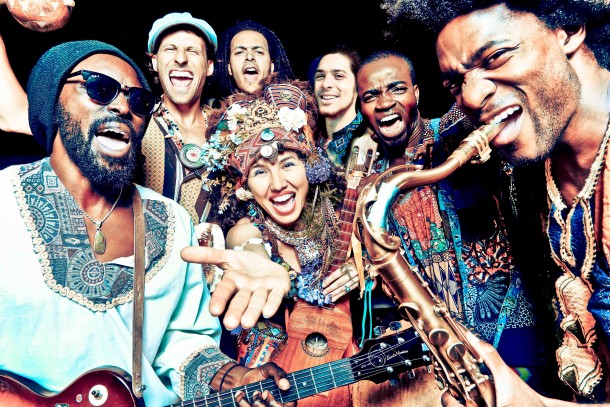
Family Atlantica, musicians from both sides of the Atlantic
Have you received many negative answers on some of the LPs you were trying to reissue?
One or two – mostly by people who believe they can out-perform the market and sell hundreds of thousands of copies more than all the other releases in the same genre! There are some big egos out there and the music industry has more than it’s fair share- always has and always will. Most people (95%) are cool though – but occasionally some do take a bit of convincing. Some are also worried that they don’t technically have the rights sign a master contract as they signed the rights away when they were young. Others have no such worries at all!
There are more and more reissues of old LPs, and more and more record labels (major or indie) now release their new artists on LP, or EP. Do you think that the LP reissue market could ever reach saturation point?
I think it’s possible yes. There are certainly a lot of people who buy vinyl because either they think it’s cool (often these people are just rich and don’t actually ever listen to music properly) and or because they see it as a good investment, which it often is these days. I think it’s inevitable that many of those people will offload it all in spades in a few years and the market could see a glut of cut-price titles. The whole vinyl speculator thing is a pain in the arse to be honest. Its just people with money buying up stock and then letting it back out at way over the odds – and these are people who can afford to sit on it. It’s not necessarily a bad things for labels as they sell out quickly on limited runs but it just means the vinyl market is controlled by investors and real music fans with not enough money to keep up can’t get the releases they want for the right price. Simple economics I guess but I never really thought it would hit the new vinyl world in quite the way it has.
You are not only focused on « old » Lp, compilations. What is the best deal/business: to make reissues or to produce/coproduce new records?
New records are a better thing to do for me personally right now but not necessarily always the best business in the short term – it’s a commitment and emotional investment in the music scene right now. Re-issues and compilations may sell quicker in the short run but over time for a label I think new releases and building catalogue in that area is the best way to go. Also we run a publishing company that publishes much of our new output – This is potentially a far better way to pay the bills in the long term but it takes time and is far from always predictable. People’s attitude to old music is that it’s somehow validated by time – they have a solid idea about the 60s or the 70s or the 80s (or now the 90s) in their heads that’s been confirmed by hundreds of books, documentaries, social commentaries and articles in a way that whats happening now isn’t. Some people play safe and wait or tell themselves they only like music of a certain era – it’s very much like vintage fashion. The idea of music existing in a far-off pre-internet time (and somewhere more exotic) makes many people trust it more somehow especially if it’s a bit wonky, loveable or low-fi. Of course music can be very evocative of a certain time and eras go in and out of fashion with different generations. Occasionally records turn up that are meant to look old and people aren’t sure. There was a Caribbean calypso-funk 45 a few years ago that was made in 1999 but sold as a 70s record – I remember a few people going nuts over it but then were upset when they found out it wasn’t old – the music remained exactly the same but the provenance had changed so it became less ‘real’ somehow in their eyes.
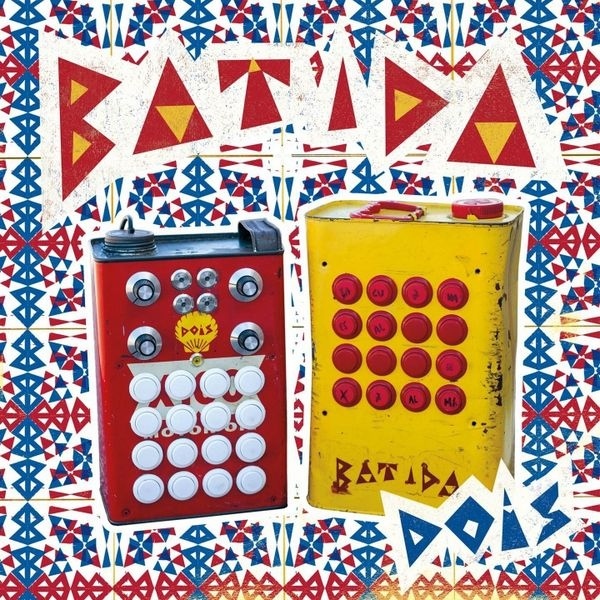
Batida feat Sacerdote
Bantu
Are they two different jobs?
New bands are obviously more demanding and the process of promoting new records is much more involved – compilations and re-issues often sell themselves – so yes a little bit.
Dexter Story looks like a vintage record, just like Ghana Soundz. What is this project about, and how does it fit into your catalogue ?
Dex is a very experienced musician who has played on a lot of amazing musicians’ records from Kamasi Washington to Gaslamp Killer and way beyond. He is from Los Angeles but like many people over the past ten years became obsessed with classic Ethiopian and East African music. The Wondem project has it’s feet rooted in the 1960s, 70s & 80s music of that region but is also extremely modern in many ways and not just a straight retro duplicate – that was what attracted me to it.
Could you tell us more about Fumaça Preta and Batida. Is there a « luso » connection ? How did you discover them ?
Fumaça Preta are a band that again struck me because of the way they took wigged out Brazilian psychedelic rock from the 70s but melded it with bits of acid house, punk and metal in a way I hadn’t really heard anyone else do. They reference a ‘smorgasbord’ of musical styles from Funaná to Funk but wrap it up in their own unique, lysergic way. Alex the drummer is a big time record collector who co-runs a store in Amsterdam called Vintage Voodou – he sent me the demos and I was hooked immediately.
Batida is an electronic dance act from Lisbon run by DJ Pedro Coquenão. He grew up in Angola and so was immersed in the sounds of classic 70s Angolan music all around him which he sampled and incorporated into his sets. These morphed into the Batida live show that features dancers, live musicians and slide shows – he entertains and educates people in equal measure at his gigs. I heard Batida on a compilation that came out a few years ago on Crammed by the Radioclit/Secousse crew and got in touch with Pedro tyo see if we could work on an album.
Meridian Brothers, Bomba Estereo, Los Miticos Del Ritmo, Family Atlantica, again another branch of Soundway, more South American. What could be the meeting point of all these releases?
I guess they are all in some way referencing the music we re-issued on compilations and re-issues and so it was an obvious progression – I think we’ll get further and further away from that in time though and already this year we are signing some acts that have nothing at all to do with South America or Africa.
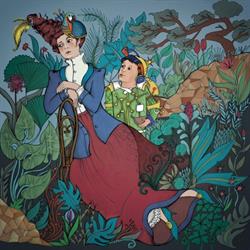
Meridian Brothers
Doctor Trompeta
Can we mention a certain eclecticism in terms of catalogue? Is it more difficult to be well received, well identified, by the media and record shops or is it in fact a force?
Again I think it’s harder in the short term – Many journalists and distributors/stores just want to put you in a one genre box and keep you there but I couldn’t think of doing that – As I said before I have very wide tastes musically so want to keep moving and surprising rather than getting stuck in one place. Its tough sometimes but as the catalogue grows people start to get it. Major labels can do it so why not independents?
What could be the label’s leitmotif?
Music from Planet Earth : Past, Present, Future.
What are your next releases?
New Albums by Fumaca Preta (Darker and more introspective than the first maybe) & Family Atlantica (featuring Marshall Allen and Orlando Julius). Psychedelic pop from Flamingods with “Majesty” – I saw these guys in a tent I was DJing in at Glastonbury last year and was blown away – a whole band of multi-instrumentalists who met in London and the Middle East. This is their third album and has shades of early Pink Floyd, Os Mutantes, the Beatles & Sun City Girls, crashing into Les Baxter and Martin Denny. Then we have a new 45 by Chico Mann, Kenya Special Volume 2 , re-issues of People Rock Outfit and Jay-U experience from Nigeria and some edit 12s. Later on in the year I hope the new Ondatropica album will drop alongside some more new signings and re-issues etc and a comp of Nigerian Disco and Boogie.
What is the LP you dream of reissuing?
If I tell you that 100’s of other people will try and do it first!
https://www.soundwayrecords.com/Shop/
